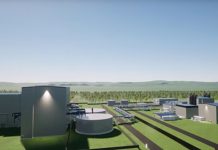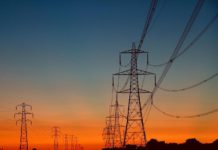(Updated to include comments from other parties with interest in the case)
Evergy on Monday announced plans to spend more than $2 billion to build two new natural gas plants in Kansas to meet growing demand for energy.
The company announced its plans to build the plants – one in Sumner County and one in Reno County – after it notified state regulators that it will seek approval for the project.
The 705 megawatt plants are expected to cost more than $1 billion each.
They would be the first base load power plants that Evergy has constructed since the Wolf Creek nuclear power plant in Burlington came on line in 1985, company officials said.
If approved, the plant in Sumner County is expected to begin producing electricity in 2029, while the plant in Reno County is expected to start operations in 2030.
Construction of the new plants is expected to increase rates for electric customers to cover the cost of their construction, company officials said.
The increases, which could range from 5% and 8%, would not be expected to be imposed for five to six years from now after the plants are up and running in 2029 and 2030.
Company officials said that would be roughly about a 1% increase in rates a year over the five years of construction.
The increases would apply to Evergy’s central service area, which covers Topeka, Pittsburg, Wichita, Hutchinson and other communities in the eastern third of Kansas.
The company also plans to ask Kansas regulators to give the utility the ability to recover interest and carrying costs for construction of the new gas plants through a line item added to the customers’ bill.
The measure, just approved by the Kansas Legislature this year, is intended to reduce the overall cost of the project and save money. State regulators have the authority to order a refund if the plants aren’t built.
More than 500 jobs are expected to be created during the construction of each plant.
After a 10-year exemption, each plant will provide more than $500 million in property tax revenues over its service life and will create 20 to 40 jobs paying more than $90,000 annually.
The company foreshadowed the possibility of building a natural gas plant in Kansas earlier this year when the Legislature passed a bill that Evergy said would help it attract investor capital needed to meet the demands of new economic development.
The bill made changes in the regulatory framework that were intended to generate revenue for Evergy to make certain investments in the grid to accommodate new development.
Company officials said it was hard to raise capital because Kansas was considered among the worst regulatory jurisdictions in the country, along with Illinois, Maine, Connecticut and Washington, D.C.
They pointed to a report issued by the North American Electric Reliability Corporation – known as NERC – that found the region was at an “elevated risk” of not having enough generation capacity to meet demand, especially in the winter.
The study, they said, suggested that more dispatchable energy production is needed.
There’s already a lot of wind generation in Kansas, they said, but what the region lacks is a sufficient amount of dispatchable power generation, which is decreasing.
“Over the last several years, we have had incredibly robust demand growth and we expect to see that continue at almost a historic pace,” said Chuck Caisley, chief customer officer and executive vice president of marketing and public affairs for Evergy.
“We haven’t seen the level of economic of activity that we’re seeing right now in decades,” Caisley said in an interview with the Sunflower State Journal.
During testimony last session, Evergy held out the promise of the state bringing in new economic development as more capital flows into the state for building the infrastructure needed to serve those new businesses.
In the last three years, 47 projects have located in Evergy’s service area, bringing 12,000 jobs and $7.3 billion in investment, officials said.
The company has more than $13.5 billion in investment and projects that could move to Kansas in the next five years.
“As Kansas and Missouri are seeing historic opportunities for attracting new businesses to our area, Evergy is committed to providing the affordable, reliable and sustainable energy our customers need,” said David Campbell, Evergy’s president and CEO.
“This growth benefits all customers by helping to hold down prices,” Campbell said in a statement.
To move forward, Evergy will need to get approval from regulators in Kansas and Missouri because it will serve customers in both states.
The company said 50% of each plant will serve the 800,000 customers in Evergy’s central region, which is the old Westar territory.
It said that 50% of the Sumner County plant will serve 350,000 customers in Missouri.
The allocation of the remaining 50% of the Hutchinson plant hasn’t been determined.
The company recently petitioned the Kansas Corporation Commission for predetermination of ratemaking principles that will apply to recovering the cost of building the facilities.
State law allows a public utility to ask the KCC before building a new power-generation plant to determine how the costs of construction will be recovered.
As of 2018, the predetermination statute had been used about seven times for wind farms, the construction of the Emporia Energy Center gas-fired generation facility, and the LaCygne coal-fired generation environmental retrofit project, according to a KCC report.
Predetermination cases can be complex because of the forecasts necessary to determine whether a generation or transmission asset is needed and whether such investment is prudent, the KCC said in the 2018 report.
Some of the forecasts that factor into such a predetermination are future customer load, alternative generation sources, future fuel costs, and the impact of demand-side management programs, the agency said in the report.
Caisley said the while the KCC will be asked to give the project the go-ahead immediately, it will decide specific rates at a later date.
He said if Evergy gets the OK to move forward, the company will not be subject to second guessing about the projects years from now.
“If they grant the predetermination, what they’re saying is that they do think that this is a good idea to move forward,” Caisley said.
“We would not expect them in a rate case to say, ‘Yeah, you know, now that we think about it five years on, we don’t like that decision, we’ve changed our minds,'” he said.
He said regulators will still evaluate how the plants are constructed – such as whether they’re over budget and if they’re producing as much as energy as promised – in deciding how much the utility can recover from rates.
“The amount of dollars that we get to recover for the plant is all based on, did we do a good job executing the plant once we started to build it,” he said.
He said the predetermination process will consider the budget for the project, which will factor into whether it’s worthwhile. He said the actual recovery of those dollars will only take place after Evergy knows the full bill for the plants.
While Evergy has a general of idea of the cost of those projects, it hasn’t yet developed a specific budget for the plants, he said.
Failure to get clearance from the KCC will mean that Evergy will have to reconsider its options, Caisley said.
“If they say, ‘no,’ it is unlikely we would build the plant,” Caisley said.
David Nickel, consumer counsel for the Citizens Utility Ratepayer Board, said he couldn’t comment on the proposal until he had more details about the company’s plans.
Jim Zakoura, president of Kansans for Lower Electric Rates, said the commercial and industrial power users he represents will review all aspects of Evergy’s plans.
“As is the case with all utility investments, it is the retail ratepayers that will pay all of the costs of the two proposed plants,” Zakoura said.
“Making decisions on new facilities, it will be important to review the continuing useful life of existing nuclear, coal, natural gas, and wind energy facilities – and whether there are alternatives to spending such an enormous amount of money that will be borne by retail ratepayers,” Zakoura said in an email.
Zakoura said regulators need to consider options such as energy efficiency, demand reduction, and time-of-use rates that he said would moderate the need for additional costs of new facilities and their impact on retail rates.
The Kansas chapter of the Sierra Club also expressed reservations about the proposal.
“Kansans know better not to be fooled by Evergy,” said Sierra Club lobbyist Zack Pistora.
“Gas is not affordable, not reliable, and in no way sustainable for Kansas,” he said.
“Evergy should instead be meeting new energy needs with lower-cost energy supplies by helping Kansans conserve energy, accessing Kansas’ tremendous solar resource, and investing in energy storage,” Pistora said in an email.
A parallel approval process will play out at the Missouri Public Service Commission with respect to the part of the project that affects that state.
If the idea is rejected in Missouri, Caisley said Evergy would have to rethink whether it still needs two natural gas plants.
“The part of our Missouri service territory that half of one of these plants is dedicated to is in need of generation,” Caisley said.
“We think we have a very compelling case and aren’t concerned about that at the moment,” he said.
The project has bipartisan support from political leadership in Topeka, including Democratic Gov. Laura Kelly, House Speaker Dan Hawkins and Senate President Ty Masterson.
The project further feeds Kelly’s economic development efforts in Kansas.
“Kansas is experiencing record economic growth, and Evergy is prepared to deliver the reliable, affordable, and sustainable energy needed,” Kelly said in a statement.
“Evergy’s multi-billion dollar investment brings direct value to the Hutchinson and Sumner County areas in jobs and tax dollars,” the governor said.
“It also ensures Kansas can continue to invite business growth that benefits the entire state,” she said.
However, Democratic state Rep. John Carmichael, who sits on the House utilities committee, urged the KCC to scrutinize Evergy’s proposal.
“Evergy’s most recent rate increase request should be of concern to all Kansas ratepayers,” Carmichael said in an email.
“They propose to spend $2 billion dollars and increase rates by 8% building two new generating plants which may not be needed,” he said.
“These rate increases are in addition to additional rate increases which Evergy will undoubtedly be requesting for other reasons,” he said.
“The Kansas Corporation Commission and its staff must carefully evaluate this proposed increase in Kansans’ utility bills to insure these increases are truly necessary spending rather than another opportunity for Evergy to profit from its already very profitable monopoly,” Carmichael said.
Hawkins highlighted the bill that the Legislature passed – and was signed by the governor – for paving the way for the development.
“We are pleased that a legislative policy we championed is helping ensure a strong energy future for the state of Kansas,” Hawkins said in a statement.
“I look forward to seeing the benefits this brings in terms of jobs, economic growth and energy security for our state for years to come.”
Masterson echoed a similar theme.
“Kansans depend on reliable electricity each and every day to power their lives and their businesses,” he said in a statement.
“These investments by a long-time Kansas energy company will make our state even more attractive to those wanting to live, work and grow a business in our great state.”
















